SUMMARY
This is AI generated summarization, which may have errors. For context, always refer to the full article.
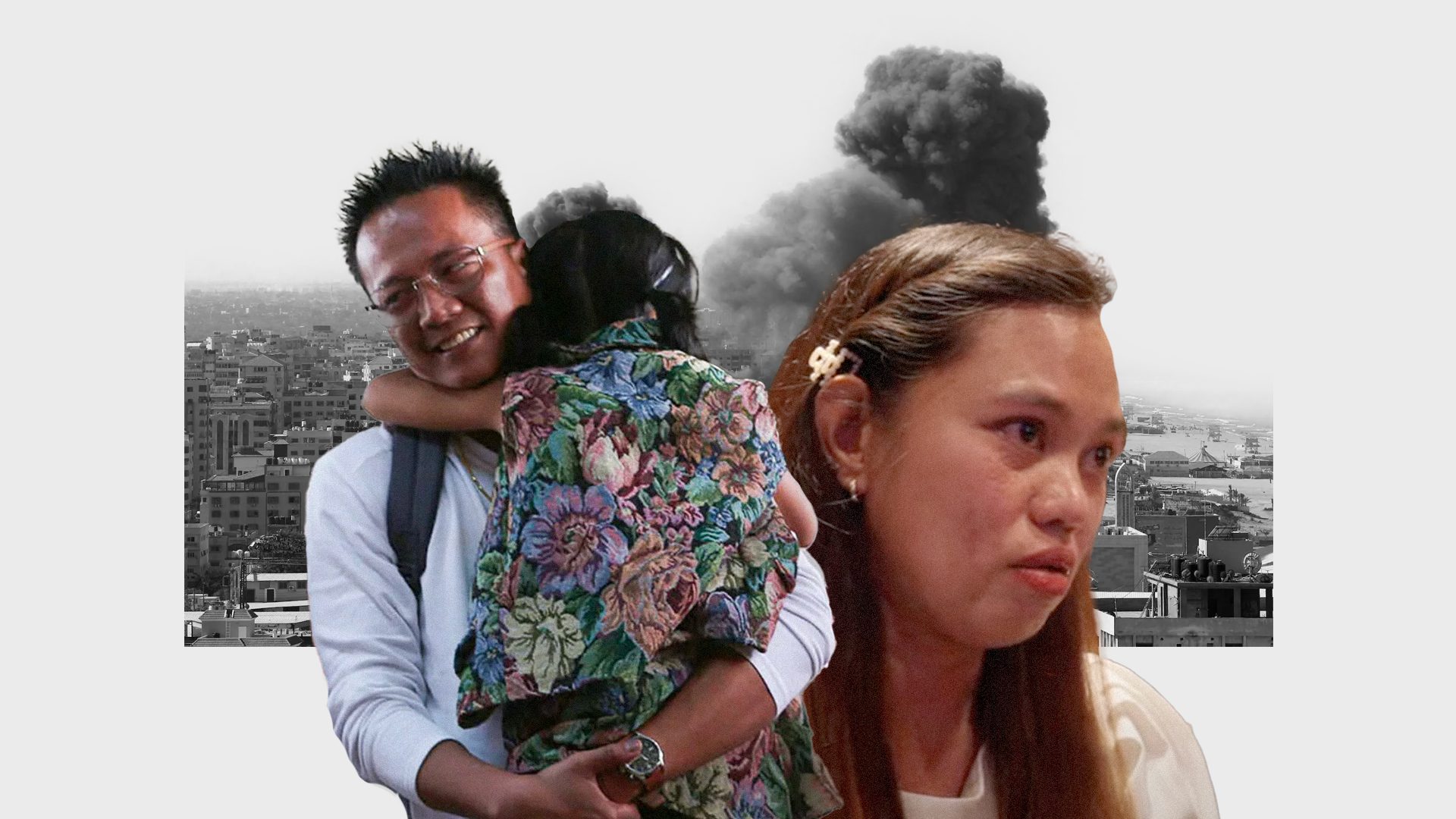
On October 7, 2023, when Hamas fighters launched a surprise attack on Israel, Jimmy Pacheco was taken hostage, and Angenica Aguirre’s sister Angelyn was killed.
Jimmy and his wife Clarice, and Angenica and Angelyn were in touch that day. Clarice and Angenica were worried by the sudden stop in messages received from their loved ones, only to find out later that Jimmy was taken, while Angelyn stayed with her Israeli employer until they both died.
Israel-based caregivers Jimmy, Angenica, and Angelyn were just some of the hundreds of Filipinos caught in the crossfire of Israel’s war with Palestinian militant group Hamas. And if one were to count Filipinos affected by the conflict, the number may reach up to 30,000 overseas Filipino workers (OFWs) in Israel and over 100 Filipinos in Palestine, multiplied by their distressed families.
The Philippine and Israeli governments have pledged support to the Filipinos escaping the conflict – the latter even promising lifetime benefits. But even with the financial and livelihood support, Jimmy and Angenica still found that the best way to keep providing for their families was to return to Israel.
Losing her best friend
Angenica, 35, and Angelyn, 33, come from a family of 10 in Pangasinan. While the eight siblings are tightly knit, Angenica said she was closest to Angelyn.
They grew especially close when they lived with their aunt in their college years. Angenica was the first to fly to Israel to work as a caregiver, and her younger sister followed her some time later. The two became their family’s breadwinners.
In a commemorative event for her sister and the three other OFWs confirmed dead in the attack on November 28, Angenica recalled how she and her sister were messaging each other from their respective kibbutz or villages. The last thing Angelyn told her was that there was no lock in their bomb shelter, and that she was scared.
Angenica was able to come home by the end of October. She saw Angelyn only days later, when she came home in a box.
Angenica knew she was going to return to Israel, despite her mother’s disapproval. She said that it was more than a job, and that she could not bear to leave her ward, whom she saw as the grandfather she never had growing up.
Her whole family brought her to the airport in January. After checking in, she went out to them to say goodbye once more.
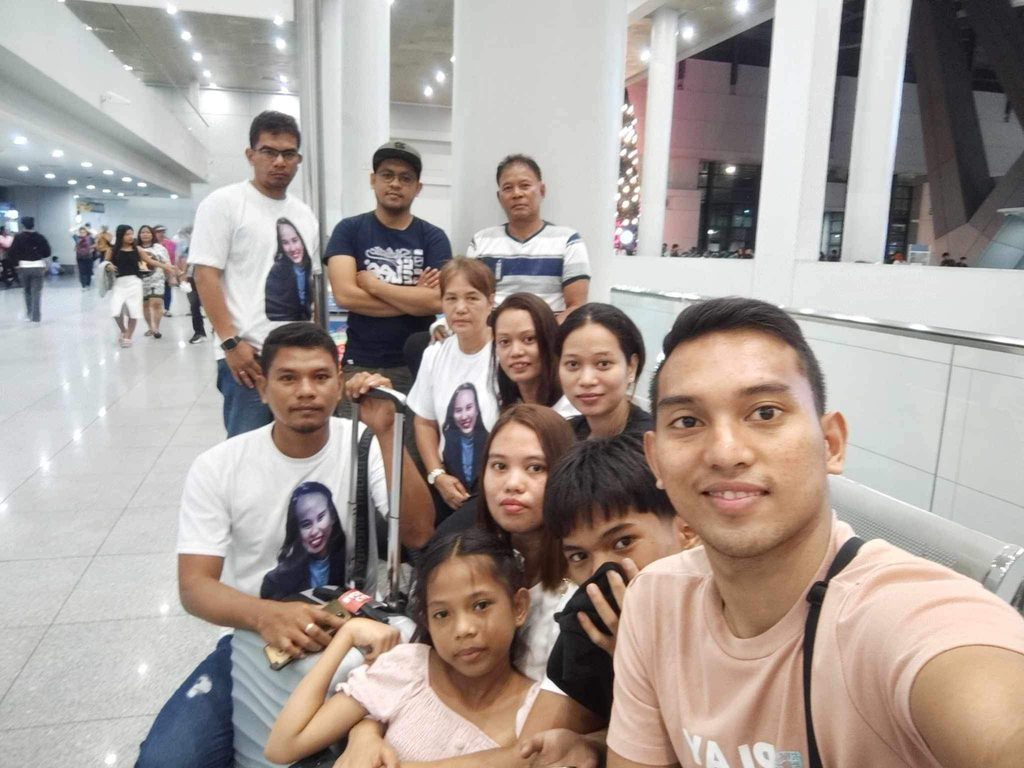
“They told me to always take care of myself and not to worry too much since we could count the days until we would see each other again. They told me to be strong,” she told Rappler in a call from Israel.
But upon landing in Israel, Angenica felt two things: fear and sadness. She was still in disbelief that her sister was gone.
Angenica was back in her daily routine with her ward, an 89-year-old, whom she bathed, fed, put to bed, and accompanied in the facility they relocated to after the attack.
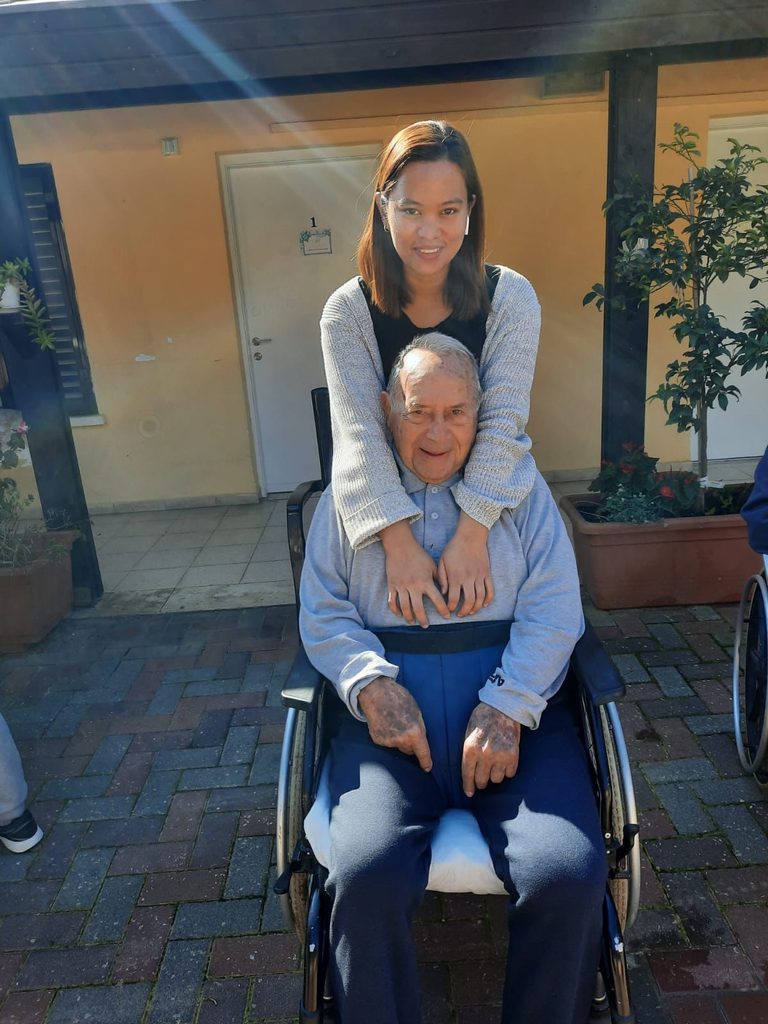
But still, she was alone. Her ward, affected by dementia, was no longer capable of having conversations about what she was going through. While there were a few Filipinos in the same facility, everyone was busy with work. Her closest friends in Israel lived an hour away.
Fearful still, but with a need to provide
Angenica is now based in central Israel – far from the ongoing aggression in the north and the south, and as Israel intensifies attacks on Palestine. No more did she wake up to sounds of rockets in her kibbutz just over a kilometer away from Gaza, the besieged Palestinian enclave.
Her trauma remained nonetheless. She was afraid of going outside, crowds, and traveling anywhere alone.
“I get paranoid sometimes. What if someone barges in, or knocks and breaks down the door?” she said.
Despite these fears, she has returned out of love for her ward and her family, for whom she was the sole breadwinner after Angelyn’s passing. Even if she knew she would be safer and happier in the Philippines, she needed to be in Israel.
Angenica said she will stay in Israel until her ward passes. In the event he does, she won’t be going home then either.
“I plan to migrate elsewhere. If there is an opportunity to transfer to another country, I will go there first, because I saw how hard life is in the Philippines,” she said.
She pointed to the high cost of goods, and not being able to save anything if one did not own a business. Expenses for her family were especially high now, as her brother has medical needs for his kidney and eyes.
Of the equivalent of P70,000 she earns monthly, P30,000 goes to the family’s daily needs, while P20,000 goes to her brother’s medical expenses. Her siblings are in and out of work, and even when they do have jobs, these aren’t enough to sustain them all, she said.
Tissue paper for survival
For Clarice Pacheco, she had to endure 49 days of not knowing if her husband was alive.
She would later find out that when Jimmy was in captivity, he ate only once a day, and sometimes resorted to eating tissue paper to survive. When one loses someone like this temporarily, it’s difficult to imagine sending them back to where it all happened. But Clarice did.
Jimmy and Clarice met when the former was a college student, and the latter was working at a fast food chain. They met and grew close through Jimmy’s cousin, who was her coworker.
Jimmy was studying to be a seaman, but things took a turn when Clarice became pregnant with twins. Neither of them were able to finish school, but they needed to decide how they were going to provide for their two boys.
Clarice encouraged Jimmy to go abroad, even though he didn’t like the idea. She had no clue about the decades-long conflict between Israel and Palestine, but she wanted him to go because “life here in the Philippines was so difficult.” She had a new job working in a casino, while he worked in agriculture. But the future seemed bleak for their children.
Jimmy left in 2018. At this point, their twins were five years old, and another baby was on the way.
In their calls, Clarice learned about the conflict. “At first, I was always nervous because of the rockets. But as time went on, even as they said there were rockets, they had an iron dome to escape to anyway. This calmed me, which is why I never expected what happened [in October],” Clarice told Rappler.
Clarice found out that her husband was taken hostage when a family friend who was also a caregiver in Israel sent her a pixelated video of him following the October 7 attack. “When it’s your husband, you know. You know, even when the video isn’t clear.”
“I actually blamed myself when he was taken hostage because I was the one who pushed him to go there,” said Clarice. While she worried for her husband’s well-being, she was also terrified of being left to provide for their three children all by herself.
Jimmy was among 24 hostages freed on the first day of the truce, November 24. It was Clarice who confirmed to Philippine authorities that her husband was free, as one of her in-laws sent a photo to their family group chat of a skinny, unshaven Jimmy in a vehicle, smiling.
“I was the only one awake then, and I was crying of so much joy. My in-laws heard me, and we were celebrating so loudly. We couldn’t sleep that night, even my children,” she said.

Weeks later, Jimmy was home for Christmas. The family received at least P170,000 from the Philippine government. From their home in Cagayan Valley, they took the kids on vacation in Ilocos and Baguio. For the first time, they spent the holidays as a complete family.
No dependence on benefits
Even on the day Clarice held her husband again, she knew that he was decided on going back.
Their children were promised scholarships from the Overseas Workers Welfare Administration, though as of posting, Clarice said that these were still being processed. Initial support from the Israeli government also came in, amounting to hundreds of thousands of pesos.
“He thought about the future of the children for when they go to college. And I realized how difficult life really is here in the province,” she said.
They understood that Israel would provide Jimmy benefits for a lifetime as a victim of war. But according to Clarice, Jimmy still wanted to work. He also worried that Israel’s law that served as the basis for these benefits might change.
“He did not want to depend on the benefits. He wants to work while the children are still small. He wants to provide for them so that they can have something they can call their own,” she said.

But why Israel, of all places? Clarice said that Jimmy had simply gotten used to working there, as he has only known work abroad in Israel.
Jimmy was back in Israel by February 2. With the financial assistance they received, the couple put up a business, Jimmy Pacheco’s Frozen Store, in Santa Ana, Cagayan.
Risks abroad more worth it?
According to University of the Philippines political science professor Jean Franco, OFWs migrating back abroad after returning to the Philippines is not new. The Philippines may be physically safer, but it did not mean security for the OFWs who fled the crises.
“This is a recurring pattern already, with regard to previous crises which have occurred which concern overseas Filipino workers,” she said.
Franco, who has written about labor export, pointed to the Lebanon war in 2006, when some 10,000 Filipinos fled the conflict between Israel and Hezbollah, but there was also a “massive return.”
A more recent example is the COVID-19 pandemic, which pushed at least 2.3 million OFWs to return to the Philippines. In a 2021 study by the Center for Migrant Advocacy, OFWs had difficulties finding work in the health sector during the pandemic due to competition with local workers, and having needed skills but lacking certain documentary requirements.
Former president Rodrigo Duterte’s policy restricting health worker deployment was also criticized – and while not all health workers seeking overseas employment may have been returned migrants, Franco said they were still willing to risk their lives to take care of COVID-19 patients as long as the job was abroad. (READ: Nursing in the UK, where the risks seemed more worth it)
“And you really cannot blame them. And the fact that they’re willing to sort of be in a place where there’s precarity because of the war, and not be here in the country shows that their livelihood and their families’ welfare are more important,” said Franco.
She also noted how migration and diplomacy are intimately linked.
“When the Philippines had to decide on certain matters…people were wondering why it took us some time on whether to issue sanctions, not just here in Israel but in other periods of conflict elsewhere. It’s because it’s not easy for us,” she said, adding that while sending workers to Israel may have been a diplomatic strategy, the country also needed to do it to provide jobs for these workers.
Franco emphasized that Filipinos simply need better salaries and more decent jobs, “because these are things that will make them stay.”
Clarice understands that Jimmy had to leave her side again. After all, it’s for their children. But if there was an opportunity for him to return home for good, she would have him stay in a heartbeat.
“If we only had enough for our children’s education, I would prefer that we all stay together,” she said. – Rappler.com
All quotes have been translated into English.
Add a comment
How does this make you feel?



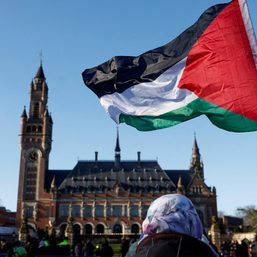






![[OPINION] Unpaid care work by women is a public concern](https://www.rappler.com/tachyon/2024/07/20240725-unpaid-care-work-public-concern.jpg?resize=257%2C257&crop_strategy=attention)


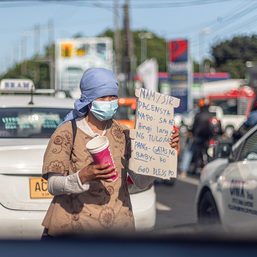

There are no comments yet. Add your comment to start the conversation.